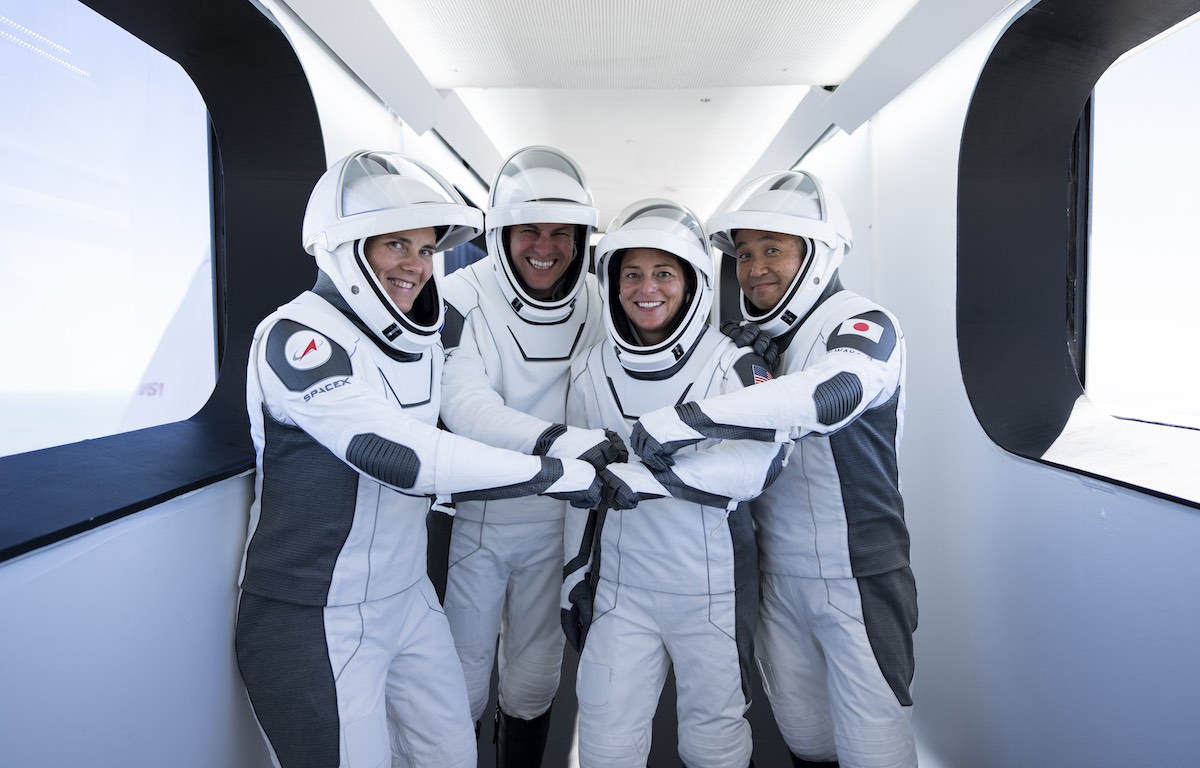
SpaceX teams and the four crew members set for blastoff this week to the International Space Station completed dress rehearsals Sunday at NASA’s Kennedy Space Center in Florida, familiarizing the astronauts with their launch day checklist and testing out the Falcon 9 rocket that will carry them into orbit.
Commander Nicole Mann and pilot Josh Cassada, both rookie NASA astronauts, took their seats in front of the touchscreen control panel of SpaceX’s Dragon Endurance spacecraft Sunday morning at Launch Complex 39A. They were flanked by Japanese astronaut Koichi Wakata and Russian cosmonaut Anna Kikina.
The four-person crew is preparing for launch Wednesday on top of a Falcon 9 rocket to kick off a planned five-month expedition on the space station, replacing an outgoing team of four astronauts scheduled for return to Earth later this month. Three other crew members — two Russian cosmonauts and one U.S. astronaut — arrived at the station in late September on a Russian Soyuz spacecraft, giving the complex its full complement of seven residents.
That number will temporarily increase to 10 people with the docking of the Crew-5 mission after launching from Florida’s Space Coast later this week, before the departure of the Crew-4 astronauts around five or six days later.
Liftoff of the Crew-5 mission is set for 12 p.m. EDT (1600 GMT) Wednesday. Assuming an on-time launch, the Dragon Endurance spacecraft will automatically dock with the International Space Station’s Harmony module at 4:57 p.m. EDT (2057 GMT) Thursday.
Mann, Cassada, Wakata, and Kikina arrived at Kennedy Space Center on Saturday from their home base at NASA’s Johnson Space Center in Houston. Early Sunday, they put on their custom-built SpaceX pressure suits at crew quarters and rode Tesla Model Xs to the launch pad, where they boarded an elevator to ride up the service structure. They walked across SpaceX’s crew access arm at the 265-foot-level and climbed through the hatch inside the Dragon Endurance spacecraft as part of a launch day dress rehearsal.
The crew members completed pressure checks of their spacesuits and verified good communications links with ground controllers before stepping out of the spacecraft and returning to crew quarters.
Later in the day, with the astronauts and ground teams evacuated from the pad, SpaceX loaded kerosene and liquid oxygen propellants into the two-stage Falcon 9 rocket. After a 35-minute countdown, SpaceX lit the rocket’s nine Merlin 1D main engines for about seven seconds. The test-firing occurred as hold-down clamps kept the launcher firmly on the pad.
Static fire! SpaceX has ignited nine Merlin engines on the Falcon 9 first stage at pad 39A. This test-firing of SpaceX’s brand new booster stage is in preparation for the launch of a four-person crew to the space station Wednesday. https://t.co/NcCafm9GUl pic.twitter.com/4ChxQJBJNa
— Spaceflight Now (@SpaceflightNow) October 2, 2022
A plume of rocket exhaust burst out of the flame trench on the north side of the pad. The static fire test is a customary part of launch campaigns for SpaceX crew missions.
It was also the first time SpaceX’s newest Falcon booster — tail number B1077 — fired up on a launch pad. The brand new rocket will debut on the Crew-5 mission. SpaceX’s Dragon Endurance spacecraft, flying for the second time, will ferry the four-person crew to the space station after deploying from the Falcon 9’s upper stage in orbit.
After launch, SpaceX plans to recover the booster on a drone ship positioned in the Atlantic Ocean a few hundred miles northeast of Cape Canaveral.
The booster for Crew-5 was damaged during when part of the rocket struck a bridge during transport from SpaceX’s factory in California to a test site in Central Texas earlier this year. The repair work delayed the Crew-5 launch from early September.
SpaceX replaced the interstage on the booster, which connects the first stage with the second stage of the Falcon 9. The company also replaced avionics near the upper dome of the booster, according to Steve Stich, NASA’s commercial crew program manager.
Bill Gerstenmaier, SpaceX’s vice president of build and flight reliability, said the company also replaced a grid fin and a grid fin actuator on the booster. The rocket has four grid fins to help support steering and provide aerodynamic stability during its re-entry back into the atmosphere, before targeting a vertical landing on the drone ship.
Engineers performed inspections on the booster in Texas, then completed pressure, structural, and hotfire testing before shipping the rocket to Florida for launch processing.
“All that work passed, and we convinced ourselves that we’ve got a good vehicle to go fly,” Stich said.
The Crew-5 mission will be SpaceX’s fifth operational crew rotation flight to the space station under a multibillion-dollar contract with NASA, and the eighth flight of a Dragon spacecraft with astronauts on-board.
The weather outlook from the U.S. Space Force’s 45th Weather Squadron predicts a 90% chance of good conditions at Kennedy Space Center for liftoff of the Crew-5 mission Wednesday. But there’s a moderate to high risk of out-of-limits winds and sea conditions downrange in the Atlantic Ocean, where the Dragon spacecraft would splash down under parachutes in the event of an in-flight abort.
Email the author.
Follow Stephen Clark on Twitter: @StephenClark1.
from Spaceflight Now https://ift.tt/kcA1aUL
via World Space Info







0 comments:
Post a Comment